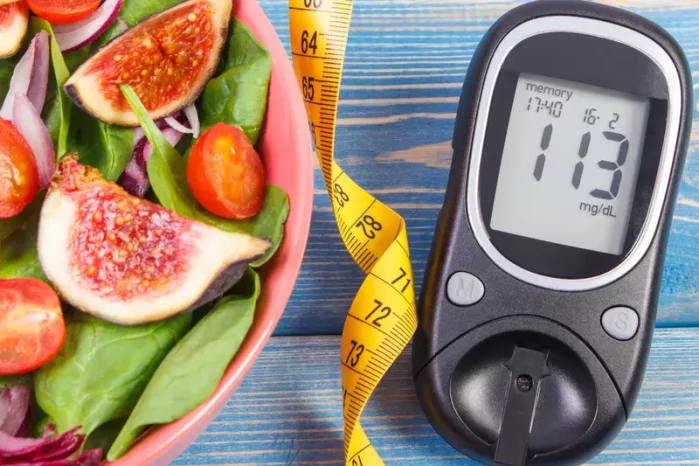Living with diabetes requires a thoughtful approach to nutrition to maintain stable blood sugar levels and prevent complications. A well-balanced diet plays a crucial role in managing diabetes effectively, providing essential nutrients while minimizing the impact on blood glucose levels. In this comprehensive guide, we’ll explore the fundamentals of a diabetic-friendly diet, including foods to include, those to limit or avoid, meal planning tips, recipes, and the importance of monitoring blood sugar levels.
Overview of a Diabetic Diet: Prioritizing Health Through Nutrition
A diabetic diet focuses on regulating blood sugar levels and promoting overall health to minimize the risk of complications associated with diabetes. By making mindful food choices and balancing macronutrients, individuals with diabetes can optimize their nutrition and improve their quality of life.
Foods to Include: Building a Foundation for Health
Incorporating a variety of nutrient-dense foods into your diet is key to managing diabetes effectively. Here are some essential components to include:
High-Protein Foods:
Protein plays a crucial role in maintaining muscle mass, promoting satiety, and stabilizing blood sugar levels. Include lean meats such as chicken, turkey, and lean cuts of beef or pork. Fish rich in omega-3 fatty acids, such as salmon and mackerel, provide heart-healthy fats along with protein. Plant-based protein sources like tofu, tempeh, legumes, and lentils are excellent alternatives for vegetarians and vegans.
Low-Glycemic Index Carbohydrates:
Choose carbohydrates that have a lower impact on blood sugar levels, such as whole grains (brown rice, quinoa, barley), legumes (beans, lentils), and fibrous vegetables (broccoli, cauliflower, leafy greens). These foods are digested more slowly, resulting in a gradual rise in blood glucose levels and better blood sugar control.
Healthy Fats:
Incorporate sources of healthy fats, particularly omega-3 fatty acids, into your diet. Fatty fish like salmon, mackerel, and trout are rich in omega-3s, which have been shown to reduce inflammation and improve heart health. Other sources include avocados, nuts, seeds, and olive oil.
Leafy Greens:
Leafy greens such as spinach, kale, and Swiss chard are nutrient powerhouses low in calories and carbohydrates. They’re packed with vitamins, minerals, and antioxidants, making them an excellent addition to any diabetic-friendly diet.
Fruits and Vegetables:
Emphasize a colorful variety of fruits and vegetables in your meals, focusing on those with a low glycemic index to minimize their impact on blood sugar levels. Berries, citrus fruits, apples, pears, carrots, and bell peppers are excellent choices rich in fiber, vitamins, and minerals.
Foods to Limit or Avoid: Making Informed Choices
While certain foods can support diabetes management, others should be limited or avoided altogether to prevent spikes in blood sugar levels and reduce the risk of complications. Here are some foods to be cautious of:
Refined Sugars:
Foods and beverages containing refined sugars should be minimized or eliminated from your diet. This includes sugary sodas, desserts, candies, pastries, and sweetened beverages, which can cause rapid spikes in blood glucose levels.
High-Glycemic Index Foods:
Foods with a high glycemic index, such as white bread, white rice, and processed snacks, are quickly digested and can lead to sharp increases in blood sugar levels. Choose whole grain alternatives whenever possible to promote more stable blood sugar control.
Saturated and Trans Fats:
Limit the intake of foods high in saturated and trans fats, including fried foods, baked goods, processed snacks, and certain cuts of meat. These fats can increase cholesterol levels and contribute to heart disease, a common complication of diabetes.
Meal Planning Tips: Strategies for Success
Effective meal planning is essential for maintaining a healthy diet and managing diabetes. Here are some tips to help you plan balanced meals:
Portion Control: Pay attention to portion sizes to avoid overeating and maintain stable blood sugar levels. Use measuring cups, spoons, or visual cues to portion out your meals.
Reading Food Labels: Learn to read food labels to identify hidden sugars, fats, and sodium in packaged foods. Look for terms like “sugar-free,” “low-fat,” and “low-sodium” to make informed choices.
Balanced Plate Method: Aim to fill half your plate with non-starchy vegetables, one-quarter with lean protein, and one-quarter with whole grains or starchy vegetables. This balanced approach ensures a variety of nutrients and helps control blood sugar levels.
Recipes and Meal Ideas: Delicious and Nutritious Options
Creating flavorful meals that align with a diabetic-friendly diet is easier than you might think. Here are some recipe ideas to inspire your culinary adventures:
Grilled Salmon with Roasted Vegetables: Marinate salmon fillets in lemon juice, garlic, and herbs, then grill until cooked through. Serve with a side of roasted vegetables like bell peppers, zucchini, and cherry tomatoes tossed in olive oil and seasoned with salt and pepper.
Quinoa Salad with Chickpeas and Spinach: Cook quinoa according to package instructions and let cool. Toss with drained and rinsed chickpeas, chopped spinach, diced cucumber, cherry tomatoes, red onion, and feta cheese. Dress with olive oil, lemon juice, and fresh herbs for a refreshing salad.
Turkey and Vegetable Stir-Fry: Stir-fry lean turkey breast strips with a colorful array of vegetables such as bell peppers, broccoli, snap peas, and carrots in a light soy sauce-based sauce. Serve over brown rice or cauliflower rice for a satisfying meal.
Monitoring Blood Sugar: Tracking Progress and Adjusting Accordingly
Regular monitoring of blood sugar levels is essential for understanding how your diet and lifestyle choices affect your diabetes management. Keep a log of your blood sugar readings before and after meals, along with notes about the foods you consume and any physical activity you engage in. This information can help you identify patterns, make adjustments to your diet and medication regimen, and track your progress over time.
Consultation with Healthcare Professionals: Personalized Support and Guidance
Every individual with diabetes has unique dietary needs and health considerations. Consulting with a registered dietitian or healthcare provider can provide personalized guidance and support tailored to your specific health needs and diabetes management goals. They can help you create a personalized meal plan, offer practical tips for navigating social situations and dining out, and address any concerns or questions you may have about nutrition and diabetes management.
Conclusion
In conclusion, prioritizing nutrition is essential for effectively managing diabetes and reducing the risk of complications. By incorporating high-protein foods, low-glycemic index carbohydrates, healthy fats, leafy greens, and a variety of fruits and vegetables into your diet while limiting refined sugars, high-glycemic index foods, and unhealthy fats, you can support stable blood sugar levels and promote overall health. With careful meal planning, delicious recipes, regular blood sugar monitoring, and guidance from healthcare professionals, individuals with diabetes can take proactive steps towards optimal diabetes management and improved quality of life.
Related Topics


























